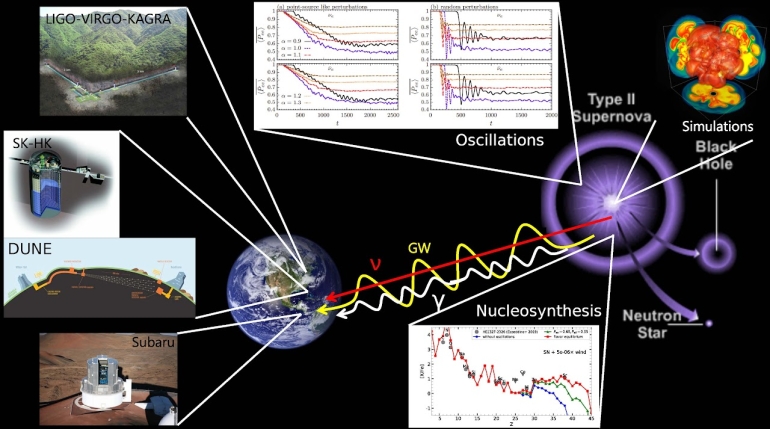INT 21-79W Highlights Report
New Directions in Neutrino Flavor Evolution in Astrophysical Systems
September 20 - 24, 2021
E. Armstrong, G. Fuller, A. Patwardhan, E. Rrapaj

Graphic generated by a superimposition of figures from the slides of Tomoya Takiwaki, Meng-Ru Wu, and Andre Sieverding.
The workshop brought together experts from theoretical, computational, and experimental fronts of neutrino flavor physics to facilitate exchange of knowledge and ideas, and to take stock of the current status of this rapidly evolving field of research. A small number of scientists from outside this field were also invited to share their perspective on different computational approaches which are novel to this field but nevertheless have the potential to prove useful. Over the course of this workshop, several different themes of research within this field were addressed via talks and open discussions, such as: (i) theory and formalism of collective neutrino oscillations, (ii) neutrinos in the early universe, (iii) neutrino flavor field instabilities, (iv) computational methods in neutrino flavor evolution studies, (v) numerical simulations of core-collapse and binary merger environments, (vi) neutrino detection from core-collapse supernovae, and (vii) nucleosynthesis, supernova shocks, and other relevant physical phenomena. Many of the talks often addressed more than one of these themes, emphasizing the multi-disciplinary nature of the work being done at the forefront of this field.
Neutrinos play a major role in transporting energy, entropy, and lepton number in the early universe and compact objects environments, and thereby lie at the heart of the ongoing multi-messenger revolution in astrophysics. Neutrinos in these environments constitute a complicated, self-interacting, many-body system, and their effects are manifestly flavor dependent. In light of the rapid progress that has been witnessed in this field over the last few years, it was important and timely for the community to come together to discuss the status of the field and to chart a path for moving forward. Despite the obvious difficulties imposed by the time-zone differences, The workshop was well-attended by researchers from across the United States, Europe, and Asia, and the discussion sessions in particular featured plenty of lively and constructive conversations as a result of the diverse participant pool.
